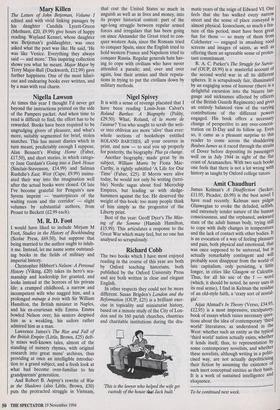M. R. D. Foot
I would have liked to include Mirjam M Foot, Studies in the History of Bookbinding (Scolar Press, £69.50), but suppose that being married to the author ought to inhib- it me. Instead, let me name some outstand- ing books in the fields of military and imperial history.
Christopher Hibbert's Nelson: A Personal History (Viking, £20) takes its hero's sea- manship and leadership for granted, and looks instead at the horrors of his private life: a cramped childhood, a narrow and incompetent wife who nagged him, and a prolonged ménage a trois with Sir William Hamilton, the British minister in Naples, and his ex-courtesan wife Emma. Emma bowled Nelson over; his seniors despised him as a weakling, his sailors rather admired him as a man.
Lawrence James's The Rise and Fall of the British Empire (Little, Brown, £25) deft- ly mixes well-known tales, almost of the standing of nursery rhymes, with original research into great mens' archives, thus providing at once an intelligible introduc- tion to a grand subject, and a fresh look at what had become over-familiar to his grandparents' generation.
And Robert B. Asprey's rewrite of War in the Shadows (also Little, Brown, £30) puts the protracted struggle in Vietnam, that cost the United States so much in anguish as well as in lives and money, into its proper historical context: part of the age-long struggle between regular armed forces and irregulars that has been going on since Alexander the Great tried to con- quer western Asia, since the Romans tried to conquer Spain, since the English tried to hold western France and Napoleon tried to conquer Russia. Regular generals hate hav- ing to cope with civilians who have never attended a parade; and, over and over again, lose their armies and their reputa- tions in trying to put the civilians down by military methods.


















































































 Previous page
Previous page